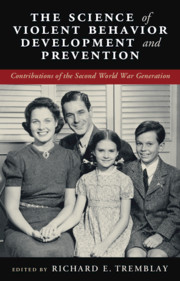 The Science of Violent Behavior Development and Prevention
The Science of Violent Behavior Development and Prevention Published online by Cambridge University Press: 28 January 2021
Jane Costello, Professor Emerita of Psychiatry and Behavioral Sciences at Duke University (United States) was born in England (1939) and received her PhD in social psychology from the University of London School of Economics. She participated in two National Academy of Medicine (United States) panels on aggressive and violent behavior. She began her career as an epidemiologist and evolved into a developmental epidemiologist, incorporating methods from the developmental sciences. Her interest in aggressive behavior started with studies of children with psychiatric illnesses. She created the DSM diagnostic interview for children. She studied the role of puberty in the development of conduct disorder. She created the Great Smoky Mountains Study in the United States, which led to an opportunity to compare the development of American Indian and non-Indian participants in response to a ‘natural experiment’: the creation of a casino. It had no effect on the children of the well-off members of the American Indian community, but it had a marked positive effect on children from poor families, even into their 30s. Results point to a critical period of exposure early in the teenage years: a bio-psycho-social phenomenon, which also has considerable economic and social effects, similar to the expected effect of a ‘Universal Basic Income’ (UBI).
To save this book to your Kindle, first ensure no-reply@cambridge.org is added to your Approved Personal Document E-mail List under your Personal Document Settings on the Manage Your Content and Devices page of your Amazon account. Then enter the ‘name’ part of your Kindle email address below. Find out more about saving to your Kindle.
Note you can select to save to either the @free.kindle.com or @kindle.com variations. ‘@free.kindle.com’ emails are free but can only be saved to your device when it is connected to wi-fi. ‘@kindle.com’ emails can be delivered even when you are not connected to wi-fi, but note that service fees apply.
Find out more about the Kindle Personal Document Service.
To save content items to your account, please confirm that you agree to abide by our usage policies. If this is the first time you use this feature, you will be asked to authorise Cambridge Core to connect with your account. Find out more about saving content to Dropbox.
To save content items to your account, please confirm that you agree to abide by our usage policies. If this is the first time you use this feature, you will be asked to authorise Cambridge Core to connect with your account. Find out more about saving content to Google Drive.